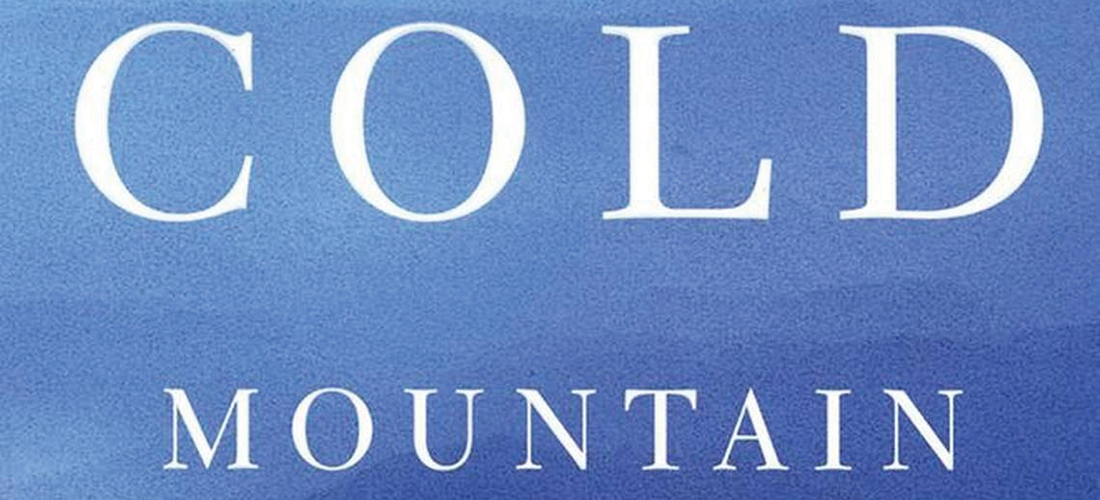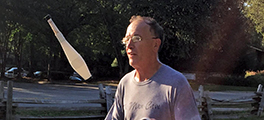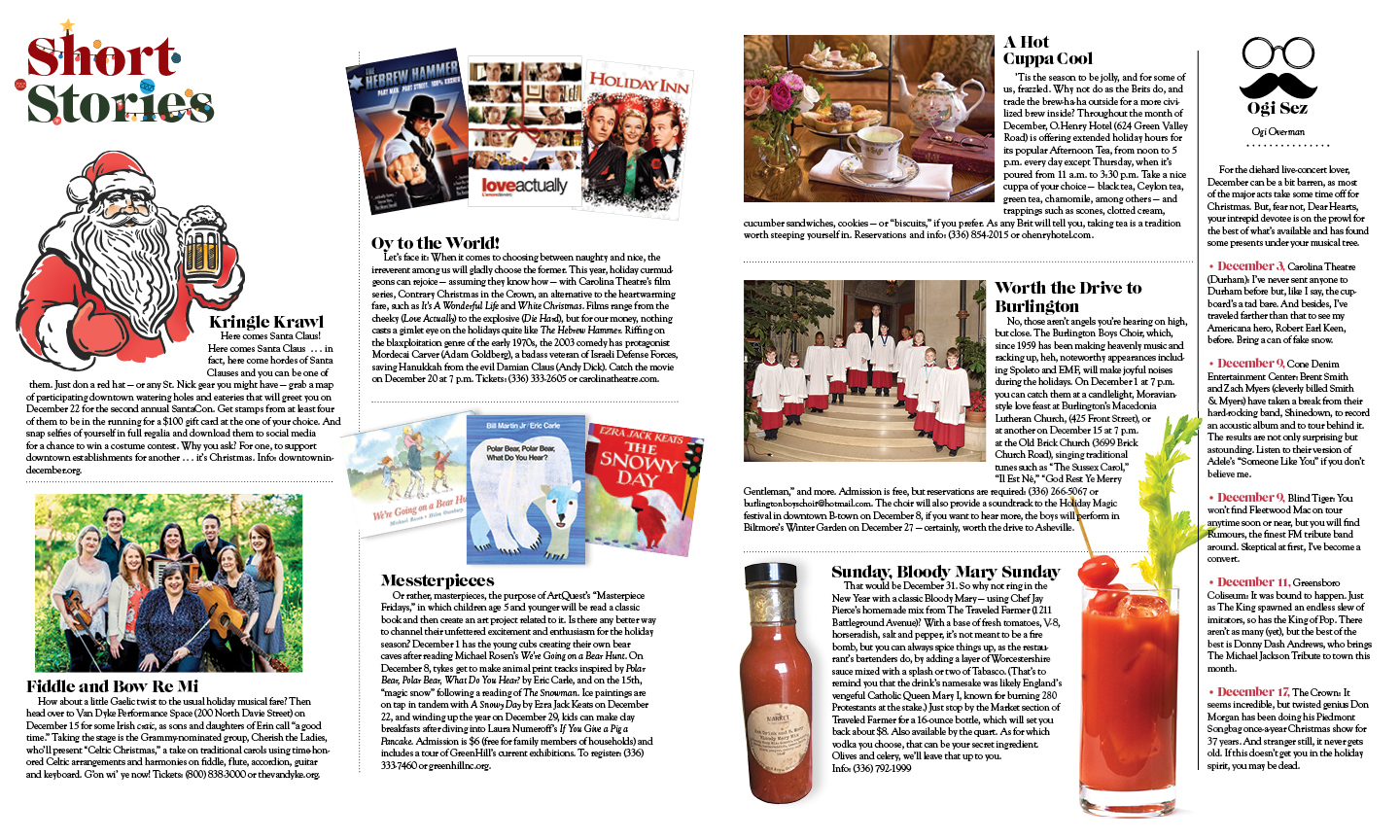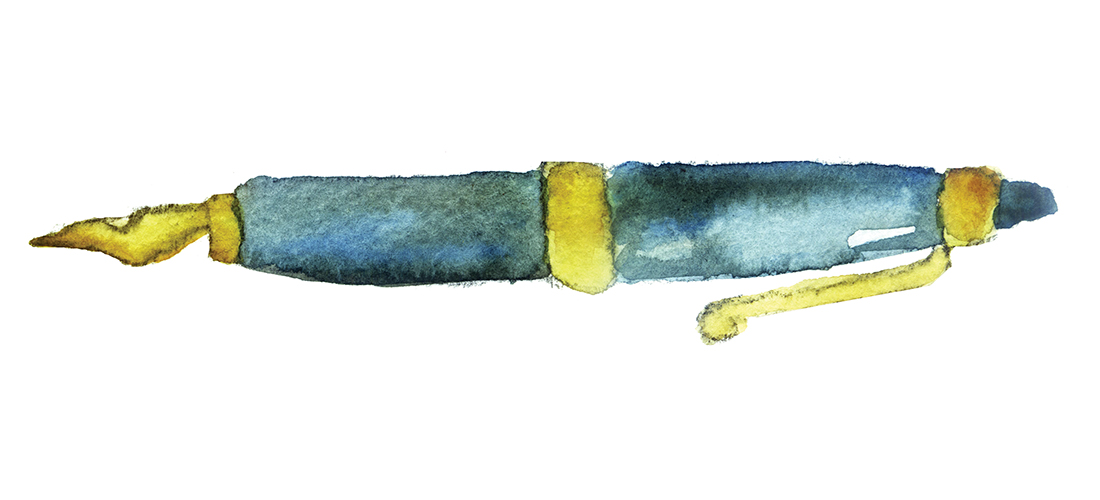The Omnivorous Reader
A Carolina Classic
Revisiting Cold Mountain
By D.G. Martin
Charles Frazierís classic novel, Cold Mountain, was published 20 years ago and more than three million copies have been sold. The book inspired a popular epic film and an opera staged in Chapel Hill in September. As North Carolina’s most admired work of literary fiction since, perhaps, Look Homeward Angel, it should be on the bookshelf of every home in our state.
The book’s great success has made its story and its characters familiar and memorable. When the name of Inman is mentioned, we think of a tired, war-worn, wounded Civil War soldier walking across the Piedmont and foothills determined to make his way back home to Cold Mountain and to Ada, the lovely Charleston-reared Ada, whom he hardly knows, but deeply loves. She is out of place, struggling, and starving on a mountain farm. Ruby, an uneducated mountain girl, full of energy and grit, rescues and restores Ada and the farm, where the two women await Inman’s poignant return and the accompanying tragedy.
As in Homer’s Odyssey, the returning soldier’s travel toward home provides the framework for a series of adventures and contacts with a variety of compelling characters. The book opens with the battle-wounded Inman recovering in a Confederate hospital in Raleigh. Outside the hospital a blind man is selling boiled peanuts. When Inman asks what he would give for just a few minutes of sight, the peanut man replies, “Not an Indian head penny.” He explains there are things he would never want to see. Inman understands, because he remembers vividly the horrors of war and the battles he experienced and wishes he had never seen them.
As Inman’s condition improves, he resolves to desert, leave the hospital, and begin his walk toward Cold Mountain. Not long after his trek begins, in the woods near a river, he sees a fallen preacher bent on killing a woman he has impregnated. Inman rescues the woman and brutally punishes the preacher.
Soon afterwards, he encounters and angers some armed and dangerous locals. They follow him to a river crossing. As he canoes across the swollen river they fire a barrage of bullets that destroy the canoe and almost kill him.
After Inman’s escape, he meets a deceitful redneck named Junior, a farmer and bawdyhouse keeper, who drugs Inman and sells him out to the Home Guard. After marching its prisoners in chains for several days, the Home Guard loses patience and executes its captives. Inman survives miraculously and goes on the road again, but only after returning to extract vicious revenge on Junior, whom he finds salting ham in his smokehouse.
Frazier describes the brutal details. “Junior raised up his face and looked at him but seemed not to recognize him. Inman stepped to Junior and struck him across the ear with the barrel of the LeMat’s and then clubbed at him with the butt until he lay flat on his back. There was no movement out of him but for the bright flow of blood which ran from his nose and cuts to his head and the corners of his eyes. It gathered and pooled on the black earth of the smokehouse floor.”
The fight with Junior is only the beginning. Along the way to Cold Mountain are encounters at every stop, many of them bloody. Inman’s travel home, like the Civil War battlefields, is marked by violence and death.
Frazier writes, “He could not even make a start at reckoning up how many deaths he had witnessed of late. It would number, no doubt, in the thousands. Accomplished in every custom you could imagine, and some you couldn’t come up with if you thought at it for days. He had grown so used to seeing death, walking among the dead, sleeping among them, numbering himself calmly as among the near-dead, that it seemed no longer dark and mysterious.”
But Inman has another, softer side. He loves nature and carries with him Bartram’s Travels, William Bartram’s description of his travels in the American South in the 1770s. In Inman’s view, “the book stood nigh to holiness and was of such richness that one might dip into it at random and read only one sentence and yet be sure of finding instruction and delight.”
Bartram’s description of a mountain scene that reminded Inman of Cold Mountain was his favorite selection. “Having gained its summit, we enjoyed a most enchanting view; a vast expanse of green meadows and strawberry fields . . . companies of young, innocent Cherokee virgins, some busy gathering the rich fragrant fruit, others having already filled their baskets, lay reclined under the shade of floriferous and fragrant native bowers of Magnolia, Azalea, Philadelphus, perfumed Calycanthus, sweet Yellow Jessamine and cerulean Glycine frutescens, disclosing their beauties to the fluttering breeze, and bathing their limbs in the cool fleeting streams; whilst other parties, more gay and libertine, were yet collecting strawberries, or wantonly chasing their companions, tantalising them, staining their lips and cheeks with the rich fruit.”
When Inman read this passage aloud to Ada at their reunion, “he could not wait to reach its period for all it seemed to be about was sex, and it caused his voice to crack and threatened to flush his face.”
Alternating with the chapters describing Inman’s travels are reports of Ada’s and Ruby’s growing friendship and success in managing the farm together.
The superstitious Ruby gives us a picture of farm life 150 years ago. Frazier writes, “The crops were growing well, largely, Ruby claimed, because they had been planted, at her insistence, in strict accordance with the signs. In Ruby’s mind, everything — setting fence posts, making sauerkraut, killing hogs — fell under the rule of the heavens . . . November, will kill a hog in the growing of the moon, for if we don’t the meat will lack grease and pork chops will cup up in the pan.”
Inman finally makes his way back to Cold Mountain. His homecoming and reunion with Ada are joyful, but short lived, as Inman dies in a firefight with the Home Guard.
Giving away the closing is not a spoiler. After 20 years in print, the book’s ending is no secret. But people still ask Frazier, why didn’t you let Inman live and make a happy ending?
Frazier explained to me that the real Pinkney Inman died in a gunfight with the Home Guard. Therefore, he said, “having that knowledge in my mind, I wrote the character to go with that ending without really fully accepting it. But at that point, where I had to decide, then I realized, it’s going to feel fake if I come up with a way for him to survive this.”
Frazier continued, “I got to the point toward the end of the book where I had to decide. And I drove all the way from Raleigh up to Haywood County. There’s a cemetery there, in a little town called Clyde, where Pinkney Inman is buried, but there’s not a marker. And I just walked around, looked at the view, and I just thought, you know, there’s only one way to end this, that I knew what happened from the first page of writing this book, to the real character, and it’s built in.”
Frazier’s decision resulted in the classic that has stood the test of time. Reading it cover to cover is still a moving experience.
But also, like Bartram’s Travels for Inman, we can pick up Cold Mountain and “read only one sentence and yet be sure of finding instruction and delight.” OH
Charles Frazier tells much more about Cold Mountain and his experiences writing the book in his interview on UNC-TV’s North Carolina Bookwatch at: https://video.unctv.org/video/3004954333/
D.G. Martin hosts North Carolina Bookwatch, which airs Sundays at noon and Thursdays at 5 p.m. on UNC-TV.






